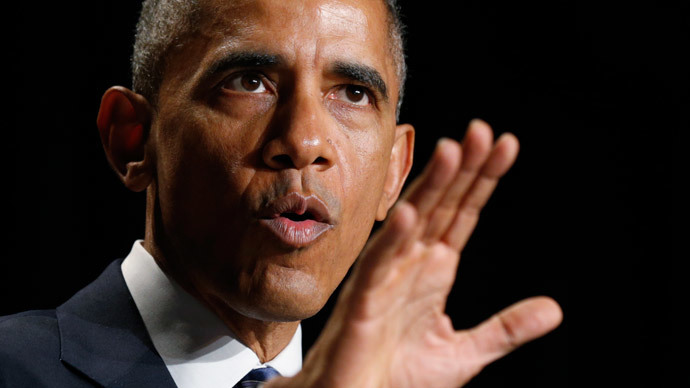National Security Strategy: ‘US cannot define own enemy’

The US National security strategy document has no real priorities and top issues which the government should be focused on, Larry Johnson, former CIA and State Department official, told RT. The US can’t define its greatest threat, he added.
President Obama released an updated National Security Strategy last Friday. The 29-page document outlined Obama’s foreign policy priorities for the final two years of his presidency. The president highlights America’s indispensible global leadership and he also admits that the country’s resources and influence are not infinite. Amongst the most pressing challenges named by Obama are violent extremism, the Ukrainian crisis, cyber attacks, and climate change.
RT:Is there anything dramatically new in the national security strategy?
Larry Johnson: No, it is more of the same. I used to be a college professor. This reminds me of a poorly prepared term paper by a desperate student who hadn’t properly prepared for the exam. This thing is a mess.
The priority is violent extremism. What is that? They fail to describe radical Sunni Islamic terrorism for what it is. Instead they go for other euphemisms and in the process they end up not being able to define it, or they talk about their global leadership.
And yet what the US is doing for global leadership is bent on provoking confrontation with Russia, it would appear to me. When you take the provocative step of wanting to harm the government of the Ukraine, it is not the recipe of the world leadership and peace in my book.
RT:The document highlights America's indispensable global leadership. How do you view this recurring idea of “exceptionalism”?
LJ: Actually Obama has not been much on exceptionalism and has come under criticism by many conservatives for this refusal. There is still this attitude within the US.

And I think you also see that in Russia. Both countries have a tendency to stand in front of the mirror and tell each other how beautiful they are. We failed to recognize the wort on our own face in a lot of this.
You read this strategic document, this document outlining so-called strategy. There is no strategy, there is no real prioritization, there is no real putting number one, number two, number three, or all the top issues that we need to be focused on.
At the same time, Russia and the US have invested mutual interest in containing and defeating radical Sunni Islam. That is in the interest of both countries.
RT:The strategy promises to strengthen the country's commitment to a free and peaceful Europe but at the same time the US proposes to deliver weapons to Ukraine. How would you explain this?
LJ: It is schizophrenic, it’s madness, frankly. The part of the problem is mainly the American people are just ignorant of history. And they don’t even have an inkling of the understanding of the kind of losses that the former Soviet Union encountered in WWII against the Nazis. When you have just the Battle of Moscow alone, the Russia people incurred more casualties than the US incurred in the entire WWII.
So we even don’t even begin to understand and appreciate the sensitivity of border issues in Russia. And yeah, we’re taking this kind of provocative step. When you try to explain it to folks on this side they just look at you bluntly, many do not understand or appreciate it. I think it is a very dangerous game and a part of it is locked in people’s mind settled back in the Cold War with the benefit of hindsight. We see what a colossal waste of money, time, and effort that thing was.
RT:The strategy points at Russia’s quote "belligerent stance toward other neighboring countries.” Does this resurrect the ghosts of the Cold War?
L J: It’s tough to lead the world to peace when you can’t even figure out who the enemy is. That’s part of the problem. The United States, when we want to find the enemies… sometimes it’s Russia, sometimes China, sometimes North Korea, sometimes Sunni Islamic extremists and Iran.
So we can’t really figure out who the enemy is and once you define the enemy then you would think you would put together the appropriate resources and strategy for confronting that. That’s not what we are doing. That’s why I looked at this document - it is produced entirely for US domestic political consumption. It has no relevance to the rest of the people in the world.
The statements, views and opinions expressed in this column are solely those of the author and do not necessarily represent those of RT.
The statements, views and opinions expressed in this column are solely those of the author and do not necessarily represent those of RT.












